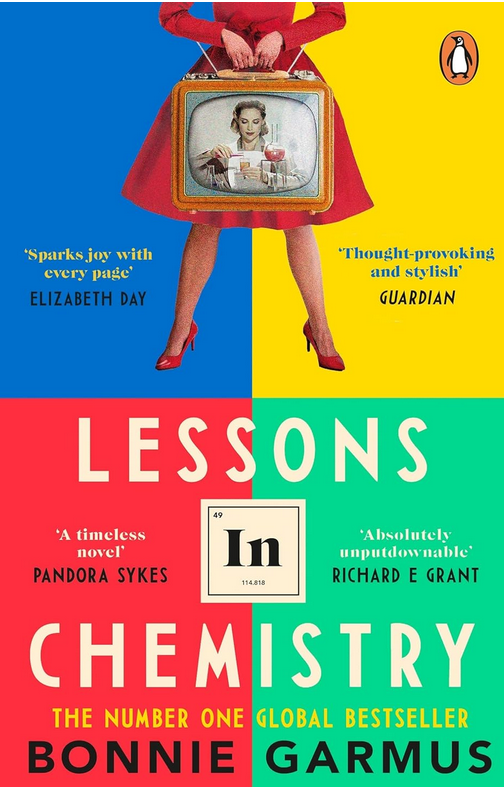
An instant bestseller in the US, quickly translated into many languages (one wonders at what cost to the quirky American humour and cultural references) and reproduced as a television mini-series, this is the debut novel by a former copywriter and creative director which at first made me suspect cynically that it just was a successful exercise in lucrative marketing. I modified this view slightly on reading that Bonnie Garmus was 65 years old when “Lessons in Chemistry” was finally published, having been rejected, it is claimed, some 98 times.
I find it hard to assess this tale of Elizabeth Zott, an ambitious young chemist embarking on a career in the 1950s, when women were expected to be mothers and homemakers, meekly occupy junior supportive roles in the workplace, generally give up their jobs on becoming pregnant, and fired if this happened “out of wedlock”. Perhaps as a result of coming from what sounds like a very dysfunctional family and possibly being somewhere on what is now called “the autism spectrum”, Elizabeth does not comply with the social norms of the day: everything is taken literally; she says exactly what she thinks, and stubbornly refuses to give up her goal to make groundbreaking advances in the field of abiogenesis – the early stages of evolution involving chemicals in “non-living matter”.
Eventually finding herself a single mother with a desperate need to earn a living after being debarred from research work by appalling levels of male prejudice, jealousy and rank abuse, she lands a job on early evening TV providing the nation’s housewives with wholesome family recipes, which she of course presents as a form of chemistry lessons. Oblivious to the fact that it was her looks which got her the job, Elizabeth mesmerises her viewers with the way she encourages them to think for themselves, have the confidence to pursue their interests and aim high, all in the course of providing scientific explanations for what makes a good pie.
Why has this theme hooked so many readers? It’s probably the sharp humour mixed with the kind of injustices which arouse readers’ sympathy. There are “marmite” characters, like the daughter who is being brought up to be astonishingly precocious, with a daily homily in her lunch box, or “Six-Thirty”, the faithful dog who thinks like a human and really seems to understand the hundreds of words Elizabeth claims to have taught him.
On the downside, apart from the over-reliance on coincidences, and chain of ludicrous events, virtually all the male characters are portrayed as unredeemed sexist monsters, in an overlong, convoluted plot which leads to a somewhat contrived, feeble conclusion. All this means that it is difficult to take this novel seriously – perhaps one is not meant to. Admittedly, it must remind older readers of how bad sexism was before the days of Equal Opportunities legislation, and is perhaps an eye-opener for younger women who do not realise how much has improved, even if not enough. It could spark debate on issues worth discussing. It’s certainly an easy read for someone, probably female, waiting for hours in an airport lounge or for some relatively minor ailment in A&E – or just simply sunbathing on a beach.
Was I supposed to be left wondering whether the author had meant to show that the extremes of good fortune, not just the ill luck, which Elizabeth experience, are all due to the influence of some man, i.e. not really her own efforts?